Author Archives: Infinite Ideas
From getting ahead in business to beating cancer, could one gene hold the key?
21 November 2013 by Infinite Ideas in Lifestyle
Infinite Ideas author (ex-Burger King CEO Barry Gibbons) today shocked the scientific establishment by unveiling work that claims to prove that one gene is responsible for success in a variety of endeavours.
Without a microscope, any scientific training and through experiments on only one animal – himself – Gibbons has managed to isolate the elusive W Gene*. Unharnessed, this rogue gene, found mainly in the human male, can cause disastrous life consequences but, claims Gibbons, it has astonishing potential when brought under control.
“It triggers a strange behavioural pattern in those who possess it,” says Gibbons. “When things are going well, when recent life has been a sequence of climbing small ladders, this demographic, for no apparent reason, does (or says) something which provides a snake to slide down. But the W Gene might be controlled, and even harnessed, with positive results. Under certain circumstances the W Gene might prove to be an ally.”
It is estimated that only a small proportion of the population carries this gene, though incidence of W-Gene affected people seems to be particularly high in the north of England (Gibbons himself hails from Manchester), among football managers and in all strands of the media. Diagnosis can take years but signs include:
- An uncanny ability to mess up one’s life, particularly when it’s going well – the W Gene seems to switch on when things get ‘boring’;
- A heightened ability to say the wrong thing to the wrong person at precisely the wrong time;
- Possession of a finely tuned bullshit detector;
- An unwillingness to suffer fools at all;
- A mischievous sense of fun and dry wit, neither of which is tuned to appropriateness of situation;
- A highly developed sense of right and wrong and an unwillingness to pursue any other course, regardless of consequences.
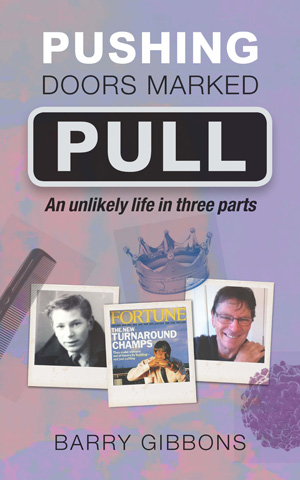 Once Gibbons discovered this genetic quirk it became clear that it was behind both his career accomplishments and his continuing successful battle against bowel cancer. More detail on this potentially world-changing discovery can be found in Gibbons’ new book Pushing doors marked pull. Rude, funny, revealing and straight talking, this book is for anybody who wants to know what it takes to succeed in spite of, or perhaps because of, yourself.
Once Gibbons discovered this genetic quirk it became clear that it was behind both his career accomplishments and his continuing successful battle against bowel cancer. More detail on this potentially world-changing discovery can be found in Gibbons’ new book Pushing doors marked pull. Rude, funny, revealing and straight talking, this book is for anybody who wants to know what it takes to succeed in spite of, or perhaps because of, yourself.
*Also known as the Wanker Gene, this hereditary gene most usually occurs in men, and can cause a range of irrational behaviours.
Bunting’s saqis
15 November 2013 by Infinite Ideas in Basil Bunting and A strong song tows us
by Richard Burton, author of A strong song tows us
I was grateful for Matthew Sperling’s positive review of A strong song tows us in the Literary Review and like him hope for a revival of interest in this great poet. I should clarify my position on one point that Sperling raises, not because it represents a mild criticism of my book but because it opens up a much wider and more important issue. Sperling suggests that I may, in my account of Bunting’s apparent predilection for adolescent girls, be a victim of ‘wilful blindness to a clear pattern in Bunting’s life’.
I thought longer and harder about this particular issue than any other, and I did so precisely in the light of the post-Jimmy Savile media hysteria to which Sperling fairly refers. The fact that I describe Bunting’s relationships with these young women should indicate that I am not blind to the pattern. Sperling may be correct about an element of ‘stunted, nostalgic sexual desire’, but in current circumstances that is enough to turn the man into a dangerous sexual predator. The reason for not drawing that conclusion is that there is not a shred of evidence that he was. I asked a number of people who knew Bunting well if they thought he had ever done anything for which he might be questioned in today’s febrile climate and received not one positive response. I am not blind to the possibility that they may have been protecting him but most of them had no particular motivation to do that. I am not suggesting that Matthew Sperling is making this particular leap from ‘pattern of relationships’ to something more sinister, but others undoubtedly will.
One of Bunting’s saqis, Hugh Kenner’s daughter Lisa, wrote about her relationship with the poet. Her account of a reading at which she officiated is a touching account of friendship across generations: “I was inexplicably moved. All thoughts of the hard bench and the itches on my nose and my aching back left me. I was no longer mesmerized by his eyes; actually, I felt that I could not truly see them, because they were not registering on this plane. It was his voice – raspy, deep, purring, falling like water – that carried me away to a level of thinking which I can barely describe, truly remember or convincingly relate. All I know is that we were alone (he and I) in poetry. We were a self-sufficient unit which read poetry and poured wine … What else could I feel but love for this old man who linked arms with me at cocktail parties … After going upstairs and pulling out the book of poetry he autographed for me, I flip through the pages trying to impress on myself the genius of this man. All the same, it is not a celebrated English poet whom I miss; rather an old man who shared a week of his life with a lonely ten-year-old.”
As Sperling says, it is a ‘delicate issue’ and I tried to handle it with care. Bunting’s saqis are around to tell their own stories if they choose to. I suspect that Lisa Kenner told us all we need to know.
For more information on the life and work of Basil Bunting, visit our dedicated site at www.basilbunting.com.
Basil Bunting and Lorine Niedecker
8 November 2013 by Infinite Ideas in Basil Bunting and A strong song tows us
by Richard Burton, author of A strong song tows us
In his Spectator review of my life of Basil Bunting, A strong song tows us, Wynn Wheldon asks if we ‘really need to read correspondence from someone who “nearly met Bunting”’, offering this as evidence that the book was ‘not terrifically well edited’. In my view A Strong Song Tows Us was expertly edited and it would be a shame if readers were discouraged from engaging with the life and work of Britain’s finest modernist poet by the suggestion that it wasn’t. The ‘someone’ in question here is the American poet Lorine Niedecker and it was only on the 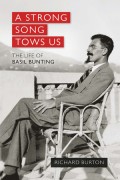 occasion of writing this particular letter that they ‘nearly met’. As is made abundantly clear in the book they did meet and formed a close poetic association. Bunting regarded Niedecker as ‘easily America’s finest female poet’ and her ‘Ballad of Basil’ captures his poetic independence with the surest of touches. As the only woman to be associated with the Objectivist movement in American poetry and as a formidable poetic talent in her own right it seems reasonable to record her opinion of Bunting, especially as the particular letter to which Wheldon objects is the only evidence we have that Bunting nearly went into business as a commercial fisherman.
occasion of writing this particular letter that they ‘nearly met’. As is made abundantly clear in the book they did meet and formed a close poetic association. Bunting regarded Niedecker as ‘easily America’s finest female poet’ and her ‘Ballad of Basil’ captures his poetic independence with the surest of touches. As the only woman to be associated with the Objectivist movement in American poetry and as a formidable poetic talent in her own right it seems reasonable to record her opinion of Bunting, especially as the particular letter to which Wheldon objects is the only evidence we have that Bunting nearly went into business as a commercial fisherman.
She clearly loved his gravelly Northumbrian voice: ‘It was so pretty as we drove into our yard the evening we came home,’ she wrote to Cid Corman in October 1968. ‘So pr-r-r-r-it-ty as Basil said.’ She confided to Jonathan Williams that Bunting’s visit was a high point in her later life and by the end of 1967 she had completed ‘Wintergreen Ridge’:
Nobody, nothing
ever gave me
greater thing
than time
unless light
and silence
which if intense
makes sound
Unaffected
by man
thin to nothing lichens
grind with their acid
granite to sand
These may survive
the grand blow-up
the bomb
When visited
by the poet
From Newcastle on Tyne
I neglected to ask
what wild plants
have you there
how dark
how inconsiderate
of me
Niedecker and Bunting had the highest regard for each other. Her ‘The Ballad of Basil’, in mentioning Bunting’s influences, quickly identifies him as completely his own poet:
They sank the sea
All land
Enemy
He saw his boats stand
and he
off the floor
of that cold jail
(would not fight
their war)
sailed anyway
Villon went along
Chomei
Dante
and the Persian
Firdusi –
rigging
for his own
singing
Bunting said of Niedecker that ‘No one is so subtle with so few words’, and when she died in 1970 his daughter remembered her father’s anger that the event didn’t get the media attention he felt it deserved. A few years later he paid her a significant posthumous compliment: “There are some very fine female poets. One of the finest American poets at all, besides being easily the finest female American poet … – Lorine Niedecker never fails; whatever she writes is excellent.’ When Jonathan Williams was considering an edition of Niedecker’s poems in the 1960s Bunting was delighted. ‘Nobody else’, he complained, ‘has been buried quite so deep.’ He considered her a ‘much better’ poet than Emily Dickinson.
For more information on the life and work of Basil Bunting, visit our dedicated site at www.basilbunting.com
New release: A strong song tows us by Richard Burton
8 October 2013 by Infinite Ideas in Basil Bunting and A strong song tows us, Book publishing
How can it be that one of the greatest and (eventually) most successful British writers of the 20th century could die in unmanageable poverty and be unremembered just twenty-five years after his death? Basil Bunting (1900-1985) was Britain’s greatest modernist poet and yet A strong song tows us: The life of Basil Bunting is the first biography of the poet to take account of all the available evidence. It was, as Matthew Sperling says in his glowing review, a life that ‘seems almost implausibly replete’. Bunting’s work was admired by the finest writers of the twentieth century, including W. B. Yeats, Ezra Pound, T. S. Eliot, Ernest Hemingway, Ford Madox Ford and William Carlos Williams. Pound edited Bunting’s first published poem, ‘Villon’, as ruthlessly as he had T. S. Eliot’s The Waste Land, and to the same stunning effect. His masterpiece, Briggflatts, catapulted Bunting to stardom and during the 1960s and 1970s he was the world’s most famous living poet, yet when he died he was practically penniless.
During his long life Bunting was an artists’ model, roadmender, sailor, balloon operator, diplomat, spy, journalist and lecturer. None of these was his true vocation – from an early age Bunting knew he was meant to be a poet. He lived in London, Paris, Rapallo, the US and Canada, and in Persia and Iraq, but his heart was always drawn to the north of England where he grew up and where he met the love of his life, Peggy Greenbank. Peggy remained in his mind throughout fifty years of separation until they were dramatically reunited after the publication of Briggflatts.
A strong song tows us shows why Bunting deserves to be recognised as a great modernist poet. Richard Burton explores Bunting’s fascinating life, takes a fresh look at some of his most important poems and unpicks the mystery of his disappearance from public consciousness. Click here to listen to a recent BBC Night Waves broadcast, in which Richard Burton discusses this topic with Anne McElvoy.
No twentieth century poet, not even Yeats, prickles the scalp quite as Bunting does. His voice is so assured, his lexical choices so deadly accurate, his timing so impeccable. You never find him reaching for effect, even when he delivers passages of the most precise, hard edged beauty:
Furthest, fairest things, stars, free of our humbug,
each his own, the longer known the more alone,
wrapt in emphatic fire roaring out to a black flue.
Each spark trills on a tone beyond chronological compass,
yet in a sextant’s bubble present and firm
places a surveyor’s stone or steadies a tiller.
Then is Now. The star you steer by is gone…
B. Bunting, Complete Poems, edited by R.Caddel (Newcastle upon Tyne, 2000)
Publishing as a business booster
2 September 2013 by Infinite Ideas in Book publishing
‘Every one lives by selling something.’
Robert Louis Stevenson
A well-published book can reap huge benefits for the author. In 2006 RainToday.com and Wellesley Hills Group published a report that confirmed this. Titled The Business Impact of Writing a Book, it was based on an extensive study of business book authors, an impressive 96% of whom reported that publishing a book positively influenced their business. The book improved their brand, generated more speaking engagements, and generated more clients, better clients and more leads. Authors were able to charge higher fees as demand for their services rose and the book allowed the business to close more deals. The overwhelming outcome of this research was, ‘Assuming you have something worthwhile to say in a book, write one!’ If you need further confirmation that book publishing can be an enormous boon find out below what some published authors have to say about their experiences.
A published book (accent on ‘published’) can bring a string of powerful indirect benefits. It can boost a CV. It can take the place of a business card, with 1000 times the impact. It can open up lucrative speaking or consulting opportunities. It can enhance an author’s reputation in a defined target market.
Barry Gibbons, former CEO Burger King and author of six books including If You Want to Make God Really Laugh Show Him Your Business Plan: 101 Universal Laws of Business, and Five Loaves, Two Fishes and Six Chicken Nuggets: Urinations from inside the fast food tent.
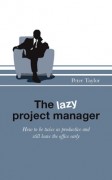 Being a published author has provided me with a significant second platform of authority. My business experience and achievements to date are critical for sure but being published has extended that authority beyond the world of project management into a wider audience. As an author I am finding doors opening with greater ease and indeed, in some cases, the doors of opportunity are being opened for me by others – which is a very nice experience, especially if you are ‘lazy’ like me!
Being a published author has provided me with a significant second platform of authority. My business experience and achievements to date are critical for sure but being published has extended that authority beyond the world of project management into a wider audience. As an author I am finding doors opening with greater ease and indeed, in some cases, the doors of opportunity are being opened for me by others – which is a very nice experience, especially if you are ‘lazy’ like me!
Peter Taylor, EMEA PMO Director at Siemens PLM and author of The Lazy Project Manager: How to be twice as productive and still leave the office early.
Publishing a book has allowed me and my business to achieve significant new credibility. The journey from the initial idea through to seeing copies of your book in the hands of customers is exhilarating. The journey required a heightened level of commitment but the prize was worth every ounce of energy. New doors open, your profile and authority are seen in a different light, it becomes easier to turn business enquiries into contracts and other platforms, for you and your business, emerge. Since writing Turn your sales force into profit heroes I have been on TV and had numerous articles published in respected journals and online for my industry. All that plus the buzz of seeing your work professionally presented on a retailer’s shelf or website.
Peter Brook, founder and MD REL Sales Consulting and author of Turn your sales force into profit heroes: Secrets for unlocking your team’s inner strength.
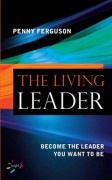 Having my book published by a recognised publisher was the most significant thing that I could do to add value to my business. It added huge credibility to the message I am delivering and positively impacted the business. We picked up some major clients as a result.
Having my book published by a recognised publisher was the most significant thing that I could do to add value to my business. It added huge credibility to the message I am delivering and positively impacted the business. We picked up some major clients as a result.
Penny Ferguson, CEO PFL Ltd, 2008 Business Woman of the Year and author of The Living Leader: Become the leader you want to be.
When I started my business there were quite a few speakers on the subject but I was the only one with a bestselling book in the market and it resulted in a quantum leap in bookings to speak at conferences. I’ve since written seven more books and each time a new book hits the shelves I receive a boost in business on the speaking circuit.
Catherine de Vrye, former Australian Executive Woman of the Year and author of Good Service is Good Business.
The Financial Times guide has led to a lot more writing work and invitations to run workshops and develop training courses as well as coaching work.
Romesh Vaitilingam, author of global bestseller The Financial Times Guide to Using the Financial Pages.
 Writing my books is definitely the most important investment I have made in my business. It totally changes people’s perception of you, increases your day rate by 100% and brings you into contact with people and opportunities that would never normally come your way. I am still amazed by the number of people I meet who know of me already because of the books. They are the only advertising anyone would ever need.
Writing my books is definitely the most important investment I have made in my business. It totally changes people’s perception of you, increases your day rate by 100% and brings you into contact with people and opportunities that would never normally come your way. I am still amazed by the number of people I meet who know of me already because of the books. They are the only advertising anyone would ever need.
Will Murray, author of Corporate Denial: Confronting the World’s Most Damaging Business Taboo.
A book makes you stand out from the crowd when pitching for consultancy work.
Annemarie Caracciolo, author of Smart Things to Know about Teams.
Being a published writer has generated consultancy and coaching work for me, not to mention invitations to speak at conferences and run workshops. In many ways, the royalties a book earns are the least important part of the financial equation.
John Middleton, author of Smart Things to Know About Your Career and Writing the New Economy: The Ultimate E-business Library.
As a consultant it is critical to be credible in front of clients, especially in the early stages of the relationship. One of the ways to develop near instant credibility is to have published books in the area of expertise in which you are consulting. There have been numerous occasions where, because of the books I have written, the client engages more readily and at a different level. This not only helps to build relationships and allow the client to trust your professional judgement, but it also helps to close sales.
Andrew Holmes, consultant and author of Carl von Clausewitz’s On War: A modern-day interpretation of a self-help classic and The Painspotter’s Guide to Broken Britain.
Having a business book published can give instant credibility to an author, especially if it’s in partnership with a major publisher. This can open the door to a lucrative speaking career, especially if the author has some charisma.
Brendan Barns, CEO Speakers for Business.
Having a book published bestowed instant credibility and authenticity. The result of being a published author is that I am taken more seriously. Since the publication of The Book of Luck my network of contacts has broadened considerably and as a consequence I have won search assignments that otherwise I would not have been considered for. I have found that doors have opened that previously would have been closed and I use my book as a calling card to speak to people at the highest level. The book has replaced my company brochure. The publication of a book opens up marketing opportunities second to none. My advice to anyone in a consultancy business is, forget the brochure and produce some original material in a book form and you will reap the benefits.
Anne Watson, author of The Book of Luck.
 By far the most credible way to build your brand is to get a book published. A published book opens doors, it gets people to pay more attention to you, it adds robustness to your CV, it generates more enquiries, it gives you the best calling card possible as well as cool collateral for meetings and conferences and it starts the process of becoming a thought-leader.
By far the most credible way to build your brand is to get a book published. A published book opens doors, it gets people to pay more attention to you, it adds robustness to your CV, it generates more enquiries, it gives you the best calling card possible as well as cool collateral for meetings and conferences and it starts the process of becoming a thought-leader.
Nicholas Bate, CEO Strategic Edge Ltd and author of Unplugged and Have it your way: 52 brilliant ideas for getting everything you want.
Once one person has believed in you (i.e. your publisher) then of course a book opens other doors (in my case for example loads and loads of TV production companies have contacted me). It is a great PR tool for the business too.
The royal baby: a reality check
25 July 2013 by Infinite Ideas in Business and finance
By Michael Lee, founder of the Institute of Futurology (www.futurology.co.za)
The royal baby is not the sign of a progressive long-term future for the United Kingdom: a futurist’s perspective.
The monarchy is probably bad for Britain’s long-term social future. Human societies evolve towards increased degrees of freedom and equality before the law. Feudalism is gone. Slavery is proscribed. Women’s equal rights have reached many parts of the globe, as has education for all. Democracy is spreading throughout the world. Free access to information has accelerated under the impetus of the internet. In the long run, the world is heading, through painful struggle, for increased freedom and equality. It is in striving for social progress that countries and societies stay vital and adaptable to changing global conditions.
 But the monarchy, which diminishes both freedom and equality with its system of hereditary, unelected power, remains in control as constitutional head of state in Britain and its Commonwealth realms. If social cohesion is built on a foundation of freedom and equality before the law how can it be beneficial for British society to preserve into the twenty-first century a medieval institution the political principles of which plainly contradict those of democracy? Since Queen Elizabeth II is also the sovereign, or supreme governor, of her Commonwealth realms, including Canada, Australia, Papua New Guinea, New Zealand, and Jamaica, this issue is international in scope.
But the monarchy, which diminishes both freedom and equality with its system of hereditary, unelected power, remains in control as constitutional head of state in Britain and its Commonwealth realms. If social cohesion is built on a foundation of freedom and equality before the law how can it be beneficial for British society to preserve into the twenty-first century a medieval institution the political principles of which plainly contradict those of democracy? Since Queen Elizabeth II is also the sovereign, or supreme governor, of her Commonwealth realms, including Canada, Australia, Papua New Guinea, New Zealand, and Jamaica, this issue is international in scope.
While the media fawn over the Royal Family because it constitutes a source of endless news copy that, like stories of celebrities, increases sales, the underlying fact is that the monarchy is an antiquated political system which fosters ideas of human subservience and inequality.
It’s ironic that the nation which pioneered the modern concept of democracy, with its historic seeds in the Magna Carta of 1215, should have ended up as the world’s leading exponent of the modern constitutional monarchy. It was the rise of merchant power in Britain which provided a new political constituency demanding ever-greater parliamentary freedom from monarchical rule and aristocratic domination.
While Britain today has a demographically ageing population, which favours the survival of the monarchy in terms of ongoing electoral support, given that older societies tend to be more conservative and change-averse, there are already pressures on the country to reinvent itself as a highly diverse, globally competitive society which can halt its global decline. These growing pressures are likely to produce a new political class which may see the monarchy as an affront to modern-day freedom, equality and diversity. I imagine a new political party may arise in Britain in the next decade which will strive to create a freer, more cohesive society and one of its ideas will be to hold a referendum to decide on the future of the monarchy.
The rise of the movement for Scottish independence provides a model for this kind of wide-ranging constitutional sea-change in British politics. In September 2014 Scotland will choose whether or not to opt for independence and rebirth. From the birth of the Scottish National Party (SNP) in 1934, it will have taken 80 years to reach next year’s national referendum. That’s a lengthy trajectory to make progress in bringing about fundamental constitutional change.
My home country, South Africa, opted to control its own national destiny when the Republic of South Africa was constituted on 31 May 1961. Looking back now, this was an important moment in our national evolution. In 1994 an internationally acclaimed political miracle ended apartheid and inaugurated the presidency of our nation’s founding father, Nelson Mandela. We were once again choosing our own destiny and pushing our evolution as a society and a people in the direction of freedom and equality.
Constitutional change is measured in decades, not years. It is also measured in the political courage required to embrace a new future. Given that in the information age, the germination and spread of ideas has greatly accelerated, I would suggest it would take a new political republican party in the United Kingdom at the very least a full generation to arrive at a realistic chance of winning a referendum in Britain to abolish the monarchy. The British monarchy has long outlived predictions of its demise. In his ground-breaking 1901 book Anticipations, pioneering futurist H. G. Wells forecast the demise of the monarchy. This institution is still going strong in 2013, well over a century later.
The Queen herself is a person of great stature, extraordinary dignity and admirable personal qualities but the institution she heads perpetuates a subtle form of oppression by enshrining the rather toxic idea that unelected political power and privilege, allied to the social inequality of an aristocracy of elites, is acceptable in a progressive and progressing twenty-first century society.
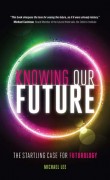 In the midst of our celebrations we’d be wise to take time to consider whether we can truly call ourselves free and progressive while the monarchy retains such power and privilege.
In the midst of our celebrations we’d be wise to take time to consider whether we can truly call ourselves free and progressive while the monarchy retains such power and privilege.
Michael Lee’s book Knowing our Future – the startling case for futurology is available at the publisher or on Amazon.

